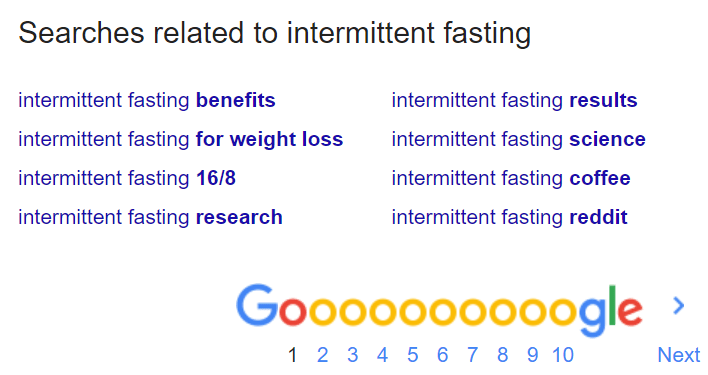Contrary to popular opinion, keyword research is not dead. Instead, it will continue to thrive as long as people use search as a primary form of seeking information online. Approximately, 93% of web traffic is derived from Internet searches that happen on different devices: a number that is reflective of the importance of keywords.
However, if you’re a publisher producing content and not performing enhanced keyword research, you are definitely missing out on capturing a bigger share of the audience. Your content now has the potential to reach worldwide, with nearly half the world’s population having access to the Internet.
In 2013, Google released their Hummingbird update which completely revamped the core algorithm used for fetching search results. Since then, SEO techniques have made a remarkable shift from keyword stuffing to analyzing and focusing on user intent.
By user intent, we mean that search engines focus on understanding the goal of a user query, instead of just focusing on the frequency of the keyword. Naturally, advancement in keyword research techniques have followed the path of recognizing user intent and optimizing search results.
In this post, we will cover effective keyword research in accordance with recent trends that have reshaped SEO techniques.
Understanding the Importance of User Intent
As mentioned above, keyword research must revolve around user intent to fetch more website traffic. Your published web page must have quality content that resolves what the user intended to search for instead of simply repeating the keyword searched over and over. Let’s see how focus on user intent impacts Internet searches:
In this example, I’m planning on visiting Japan from India. So I simply type ‘India to Japan’ in the search box.

As one can see, I receive flight results which may not be the desired result in case I was looking for an itinerary. However, if I type ‘India to Japan travel,’ the search results change completely.

With a simple addition of just one word, Google immediately displayed more relevant results, thus focusing on my intent instead of the words used in the search.
With that in mind, let us now understand how to perform keyword research that focuses on user intent and fetches you more traffic.
Understanding the Objective of Your Website or Blog
As a publisher, your primary concern most likely is increasing website traffic through quality content and effective keywords. Before getting down to just searching words that will give you traffic, it’s important to first make a list of questions that users online might be searching related to your blog or website. In other words, this list will consist of the main topics that your website deals with, including major questions that can be asked.
For example, imagine you are a nutritionist just starting your blog online. Some possible questions that you could be asked are:
- Are pre-made diet plans available?
- Do you offer online consultation?
- Are diet plans and consultation available for diabetic patients?
- Can diet plans be customizable according to underlying health issues?
- Are there any events that you might be conducting in the user’s city?
- In which city is the diet clinic located?
Additionally, here is a tentative list of the topics that your blog or website would most likely cover:
- Diet Plans
- Online Consultation
- Eating Superfoods
- Recipes
- Intermittent Fasting
- Ketogenic Diet, and others.
Finding the Right Keywords For These Topics
Now that you have created an exhaustive list of topics that your blog or website might cover, it is time to find out the right keywords for each topic. This will give you an idea of what keywords to use in creating content that consistently increases your target audience.
Let’s pick up a topic from the above list and see how we can find the right keywords:

Using SEMRush, I was able to find out the monthly search volume of the keyword ‘intermittent fasting’. Additionally, I also found out certain related long-tail keywords such as ‘intermittent fasting for weight loss’ that can further drive your website growth in a positive direction. Long-tail keywords contain more than 3 words and have a high conversion rate as they are more specific to a user’s search inquiry. In fact, 50% of search queries online are longer than 3 words. Another great way to search for lucrative long-tail keywords is to scroll down on Google search engine results page and see similar searches related to your keyword, which looks like this:

Furthermore, you can search for more long-tail keywords using any of the above related searches on keyword tools available online.
Here’s what I got when I tried to find out the monthly search volume of ‘intermittent fasting benefits’ picked up from the search above.

Filtering Out and Prioritizing Keywords from the Keyword Bank
Now that you have assembled a rough list of short and long-tail keywords that can be fruitful in bringing traffic to your website, it’s time to filter out the ones that might not profit you. Additionally, prioritization of keywords on the basis of audience engagement will also help you. This can be achieved by several methods:
Search Volume: When it comes to short keywords (which contain less than 3 words), the search volume is rather high, thus resulting in more website traffic. However, for generating organic online engagement and making users keep coming back to your website, your focus should be on long-tail keywords. The key is finding a balance between short and long-tail keywords, both of which should have optimum search volume. There are many tools available online for finding out keyword search volume including SEMrush, KWFinder, and others. Here’s how to make an informative decision based on search volume:
- If a long-tail keyword and short keyword have almost equal search volume, choose the former for user engagement.
- If a short keyword has an extremely high search volume, it means that it will be difficult to rank for it. In that case, choose a long-tail keyword with a decent search volume.
Competitor Analysis: You don’t necessarily have to aim for the keywords that your competitor is using but analysis of their keywords will provide you with better insight into your own. Using several tools online, a domain overview will fetch your organic competitors, allowing you the opportunity to see the keywords they are ranking for. Adding to that, the keywords that they are not using will give you opportunity to produce fresher content.
Using Google Trends: If you are left with keywords that have either extremely high or low search volume and you’re unsure of their relevance in the keyword bank, you can use Google Trends. Through this, you can track if a keyword has been performing well or not in the past few years. For example, here’s a graph on how ‘intermittent fasting’ has been performing in the past 5 years:

Since the keyword has gained traction in the past one year, you probably should retain it in the list for its recent performance.
Final Thoughts
While the above steps will help you in producing and sustaining good content for some time, the key lies in evaluating your keyword choices repeatedly. Once you earn more prominence in search result pages, you will find out better and newer keywords that can further enhance your content’s performance on the Internet. For additional insight, here’s an expert roundup on performing better keyword research for your website.

Shubham is a digital marketer with rich experience working in the advertisement technology industry. He has vast experience in the programmatic industry, driving business strategy and scaling functions including but not limited to growth and marketing, Operations, process optimization, and Sales.








2 Comments
Thanks for sharing that how we have to select keywords and how to find keywords for the particular topic. And yeah, satisfying users intend is the priority of any blogger.
I find that keyword research is not as important as it seems. It is important if you are starting out on a brand new unknown niche. But I find that the best keyword is basically common sense.